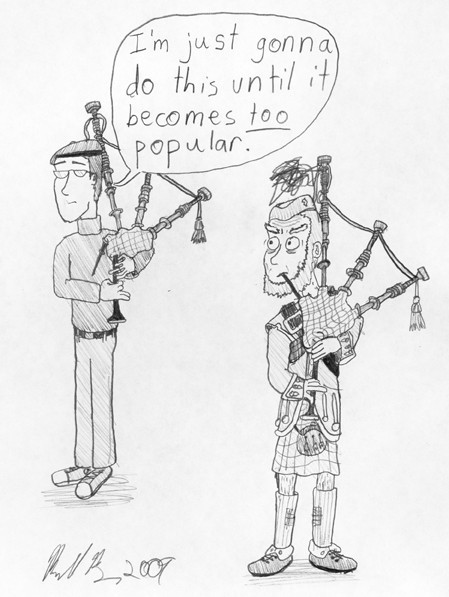Pop musicians starting to pipe up
Bagpipe renaissance sparks renewed interest in old art form
In the First and Second World War, a massive regiment of bagpipers would play on the battlefields to rattle the enemy and advance military columns.
The wall of sound they created would drown out the bullets and sounds of war.
Some were shot.
There is also evidence of piping in a rudimentary form as early as ancient Egypt.
During British oppression in Scotland, the bagpipes were outlawed.
Today, bagpiping is perhaps the most competitive instrumental undertaking there is.
Pipers play competitively as individuals or in bands, led by a pipe major.
The paramilitary structure of bands and the nature of competition has remained, but that traditional element is now being combined with a more open and varied interpretation of the music itself.
“Bagpiping is experiencing a renaissance. There is renewed interest in learning the instrument as more people are exposed to bagpipes in different, less traditional ways,” said Robyn McCombe, vice president of the Prairie Pipe Band Association and piper of 46 years.
“Technology has changed the music itself and the Internet allows people more opportunities to watch pipers play.”
University of Winnipeg education student Graeme McCombe (Robyn McCombe’s son) has played pipes in celtic rock band Banshees Wail and the traditional Lord Selkirk Boys Pipe Band, which tours Canada and Scotland competitively.
“Bands are now writing more modern music. I’ve noticed a shift from when I began playing nine years ago. There has been a movement away from the old school,” explained McCombe.
Newer artists, like bagpiper Mark Saul, have combined bagpiping with techno, and have created an entirely new sub-genre of music.
While bagpipes are beginning to appear in pop music more frequently, competition remains for some as intense and regimented as those pipers who were incorporated into the British army.
Especially competitive and ardent pipers can also now receive specialized instruction online via Skype.
The Olympic equivalent of bagpiping is held in Glasgow each year and is known as the World Pipe Band Championships.
This year, Canadian pipe band Simon Fraser took the worlds for the second year in a row.
One outcome of the bagpipe resurgence means an evolution away from older tunes – the traditional marches and ceremonial melodies – and towards a more symphonic sound.
No longer a military staple, the focus for players has shifted towards performance and competition.
The popularization of the more orchestral side of pop music has yielded a much wider appeal for this ancient instrument, and it doesn’t appear to be slowing down any time soon.
Published in Volume 64, Number 14 of The Uniter (December 3, 2009)







